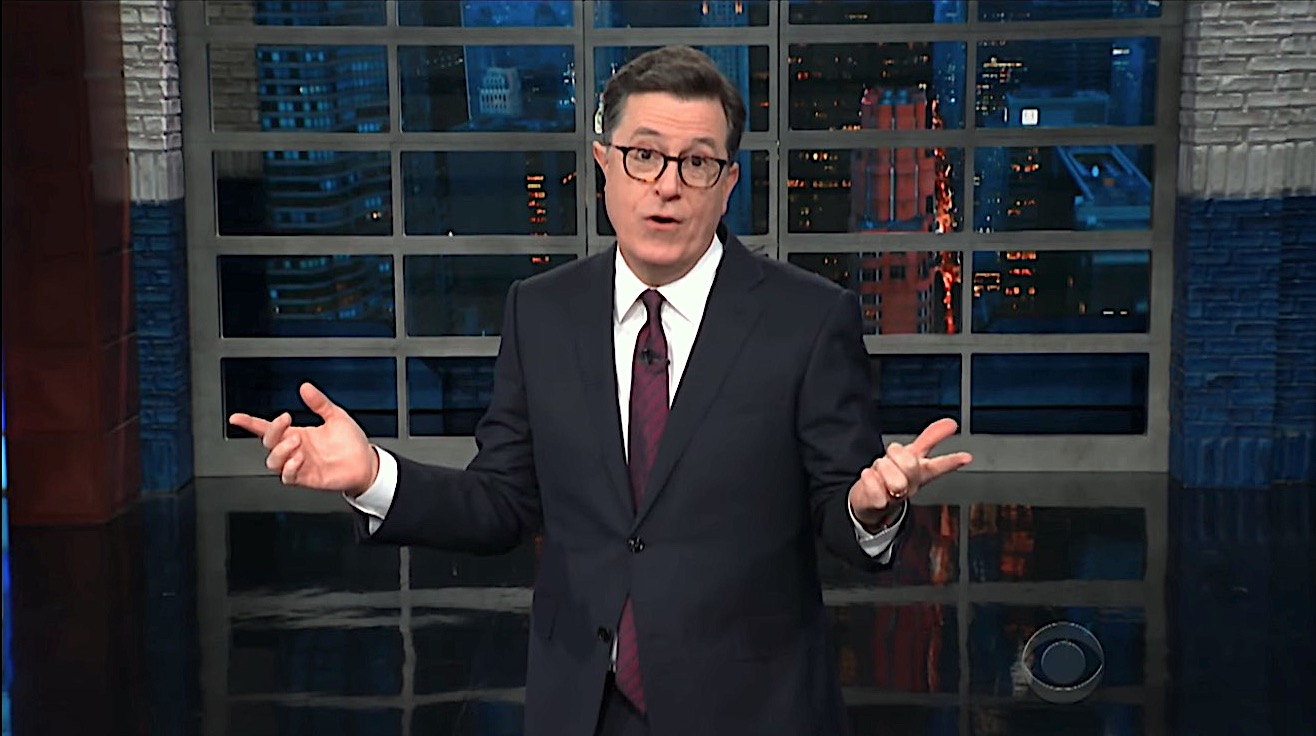Stephen Colbert thinks he's found 'the saddest Trump tweets' yet, and he's happy to explain why


"We're done talking about the president — you can have the children come back into the room," Stephen Colbert told America's parents on Monday's Late Show. "Because we're going to talk about something impressive and inspiring. This weekend was the incredibly powerful March for Our Lives against gun violence," and if the estimates are right that 800,000 people attended the D.C. march alone, that would be the biggest single-day protest in the history of Washington, D.C. — "at least until Robert Mueller gets fired," he added wryly. Colbert ran through some of his favorite homemade signs from the rally and congratulated one of the speakers for having the courage to vomit on international television.
"Of course, not everybody was inspired by these young people," Colbert said. He was specifically talking about former Sen. Rick Santorum (R-Pa.), who chided the marching teens for asking other people to pass laws instead of personally learning CPR to save the next round of bleeding students. "Yeah, kids, stop asking your government to address your needs," Colbert joked darkly. "Remember what the bill from School House Rocks! says: 'You're on your own, suckers!'"
"Meanwhile, Robert Mueller's Russia investigation must be going well, because the president's lawyers are fleeing like rats leaving a sinking Trump," Colbert said, noting the sparse remnants of Trump's personal legal team and then reading Trump's tweets denying that he's having trouble hiring and keeping lawyers in the Russia investigation. "This is really one of the saddest Trump tweets I have ever seen," Colbert said. "He knows no one wants to represent him, but he's saying everybody does. That's like when I said I wasn't going to prom because too many pretty girls asked me and I didn't want to see them cry. Oh, he's got plenty of lawyers, but they're all in Canada, modeling." He somehow ended with heavily censored Frank Sinatra tunes, and you can watch that below. Peter Weber
The Week
Escape your echo chamber. Get the facts behind the news, plus analysis from multiple perspectives.

Sign up for The Week's Free Newsletters
From our morning news briefing to a weekly Good News Newsletter, get the best of The Week delivered directly to your inbox.
From our morning news briefing to a weekly Good News Newsletter, get the best of The Week delivered directly to your inbox.
A free daily email with the biggest news stories of the day – and the best features from TheWeek.com
Peter has worked as a news and culture writer and editor at The Week since the site's launch in 2008. He covers politics, world affairs, religion and cultural currents. His journalism career began as a copy editor at a financial newswire and has included editorial positions at The New York Times Magazine, Facts on File, and Oregon State University.
-
 6 homes with incredible balconies
6 homes with incredible balconiesFeature Featuring a graceful terrace above the trees in Utah and a posh wraparound in New York City
-
 Did Alex Pretti’s killing open a GOP rift on guns?
Did Alex Pretti’s killing open a GOP rift on guns?Talking Points Second Amendment groups push back on the White House narrative
-
 The 8 best hospital dramas of all time
The 8 best hospital dramas of all timethe week recommends From wartime period pieces to of-the-moment procedurals, audiences never tire of watching doctors and nurses do their lifesaving thing
-
 ‘One Battle After Another’ wins Critics Choice honors
‘One Battle After Another’ wins Critics Choice honorsSpeed Read Paul Thomas Anderson’s latest film, which stars Leonardo DiCaprio, won best picture at the 31st Critics Choice Awards
-
 Son arrested over killing of Rob and Michele Reiner
Son arrested over killing of Rob and Michele ReinerSpeed Read Nick, the 32-year-old son of Hollywood director Rob Reiner, has been booked for the murder of his parents
-
 Rob Reiner, wife dead in ‘apparent homicide’
Rob Reiner, wife dead in ‘apparent homicide’speed read The Reiners, found in their Los Angeles home, ‘had injuries consistent with being stabbed’
-
 Hungary’s Krasznahorkai wins Nobel for literature
Hungary’s Krasznahorkai wins Nobel for literatureSpeed Read László Krasznahorkai is the author of acclaimed novels like ‘The Melancholy of Resistance’ and ‘Satantango’
-
 Primatologist Jane Goodall dies at 91
Primatologist Jane Goodall dies at 91Speed Read She rose to fame following her groundbreaking field research with chimpanzees
-
 Florida erases rainbow crosswalk at Pulse nightclub
Florida erases rainbow crosswalk at Pulse nightclubSpeed Read The colorful crosswalk was outside the former LGBTQ nightclub where 49 people were killed in a 2016 shooting
-
 Trump says Smithsonian too focused on slavery's ills
Trump says Smithsonian too focused on slavery's illsSpeed Read The president would prefer the museum to highlight 'success,' 'brightness' and 'the future'
-
 Trump to host Kennedy Honors for Kiss, Stallone
Trump to host Kennedy Honors for Kiss, StalloneSpeed Read Actor Sylvester Stallone and the glam-rock band Kiss were among those named as this year's inductees
